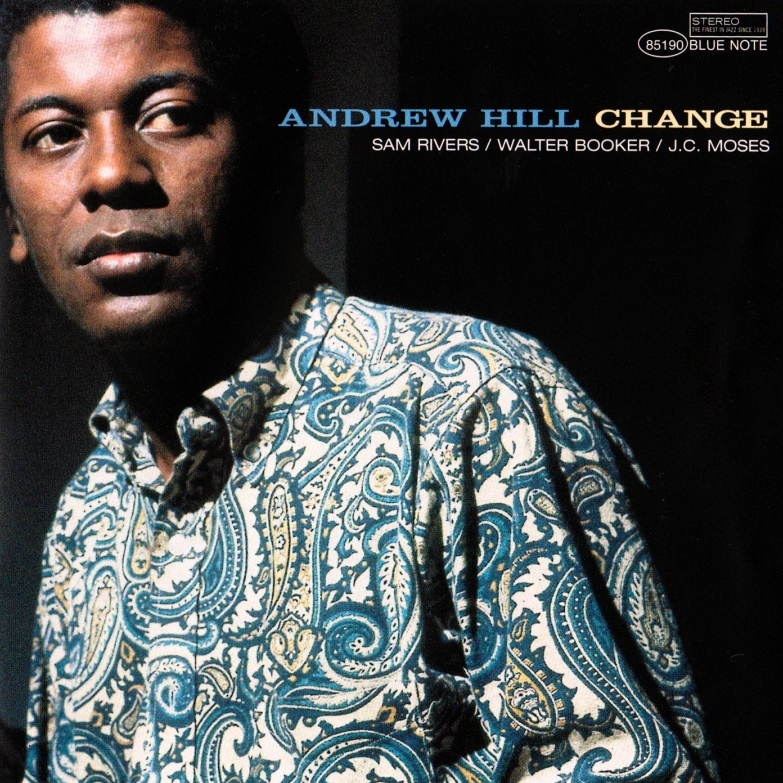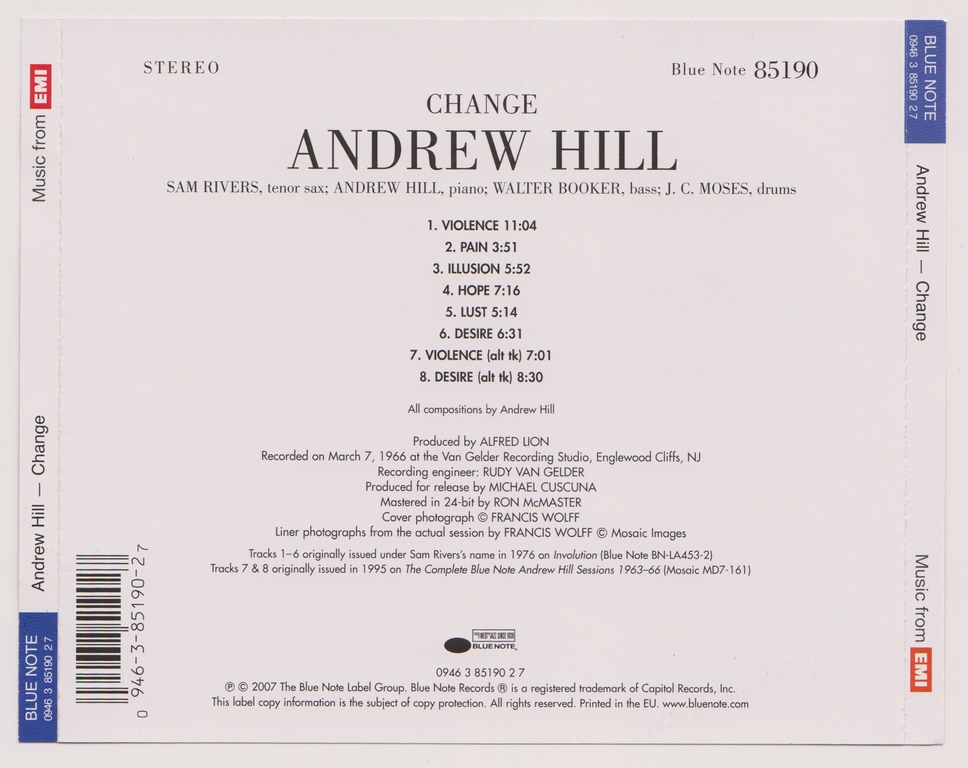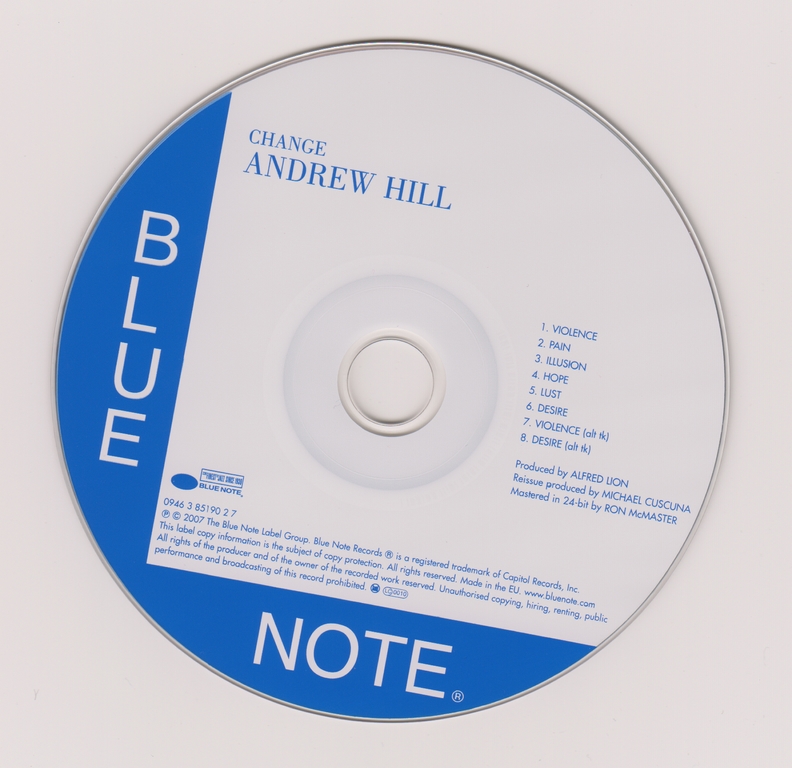


BOOKLET
Andrew Hill – Change (1966) [FLAC]
{2007, Blue Note 85190}
————————————————
PERFORMERS:
SAM RIVERS – tenor sax
ANDREW HILL – piano
WALTER BOOKER – bass
J. C. MOSES – drums
————————————————
TRACKS:
01. VIOLENCE 11:04
Andrew Hill
02. PAIN 3:51 Andrew Hill
03. ILLUSION 5:52
Andrew Hill
04. HOPE 7:16
Andrew Hill
05. LUST 5:14
Andrew Hill4
06. DESIRE 6:31
Andrew Hill
07. VIOLENCE [alternate take] 7:01
Andrew Hill
08. DESIRE [alternate take] 8:30
Andrew Hill
————————————————
CD LINER NOTES BY MICHAEL CUSCUNA:
“Compulsion”, recorded in October 1965 with a trio plus two horns and two percussionists, marked a decided turn in Andrew Hill’s music toward more freedom and longer performances. This March 7, 1966 session was the next logical step for the pianist, an intimate quartet recording with musicians who shared a sensibility and great ears, thus being able to afford each other freedom and empathy. It did not see the light of day until it was issued in the Blue Note Reissue Series of tan double albums in 1975. It was paired with an unissued Sam Rivers LP (“Dimensions & Extensions”) in the Blue Note vaults and issued under Sam’s name as “Involution”. Alfred liked this Hill date a great deal at the time and was thinking about calling it “Change”, an apt title for the change in Andrew’s approach. It was even given the catalog number 84233 and edited and sequenced for release, but a cover was never made.
In April 1965, Sam had worked with Andrew on Bobby Hutcherson’s “Dialogue”, which featured a number of Hill originals. Andrew apparently liked what he heard because this quartet of Rivers, bassist Walter Booker, and drummer J. C. Moses was — or was intended to be — a working group.
Walter Booker came to New York in 1964 and quickly made a name for himself in the employ of Ray Bryant, Art Farmer, Donald Byrd, and Sonny Rollins, among others. This was J. C. Moses’s only Blue Note appearance. He was primarily known for his work with the New York Contemporary Five led by Archie Shepp and Don Cherry. His scant discography includes Kenny Dorham’s “Matador”, Charles Lloyd’s “Discovery”, Roland Kirk’s “Kirk in Copenhagen”, and a beautiful Shepp three-tune trio session for Impulse! with David Izenzon. Moses had a loose, exuberant sense of swing. He eventually returned to his hometown of Pittsburgh because of poor health. He died there in 1977.
This date, with its titles (named after the session) based on human emotion and condition, is also more free than most of Andrew’s music.
The long first take of “Violence” ultimately became the master, although the shorter second take was initially chosen. Sam Rivers is powerful here, constantly inventive without a framework to lean on, especially in his first solo. After the piano solo, there is an impassioned tenor/piano duet and a bass solo with harpsichord accompaniment from Andrew. Sam brings the melody back in and stretches out some more. Andrew starts the alternate take without Sam and solos first. Rivers, Booker (with harpsichord accompaniment again), and Moses follow. A wonderful performance, but the longer first take is more dynamic.
“Pain,” a trio number, is more whimsical than tortured in spirit. It consists of a seven-bar theme played twice and has a swinging, Monk-ish feel. Booker and Hill both take excellent solos.
“Illusion” has a rubato theme followed by a lively Latin 4/4 montuno. It stays in tempo for the energetic, melodic solos by Andrew and Sam. A wonderful drum solo leads into the outgoing melody.
The rubato melody of “Hope” is beautifully read by Rivers before J. C. Moses moves into a bright 3/4 for the solos. Andrew again turns to the harpsichord for Booker’s bass solo.
“Lust,” the other trio number, is also oddly titled, as it is positively tender and romantic. Andrew is the only soloist on this ballad. And that’s as it should be. His playing is sensitive, beautiful, and seamless.
Sam is back on “Desire,” a four-bar melody played in a comfortable 5/4. Two tenor solos sandwich a piano solo. The first take was not initially chosen as the master, but its shorter playing time, definite ending, and strong bluesy overtones in parts of the tenor and piano solos probably led Alfred Lion to ultimately pick this one. The alternate take, longer and with a fade, also has a lot going for it. They both offer some strong playing.
Andrew recorded three more free sessions in 1967, two of which included Sam. They were only recently released on a 3-CD set entitled “Mosaic Select: Andrew Hill”. But the following year, Andrew began looking for other directions, returning to Latin and blues elements on “Grass Roots” and experimenting with voices on “Lift Every Voice”. Of all of Andrew’s work during this period, this is, for me, the most satisfying of the free dates.[/quote]
————————————————
